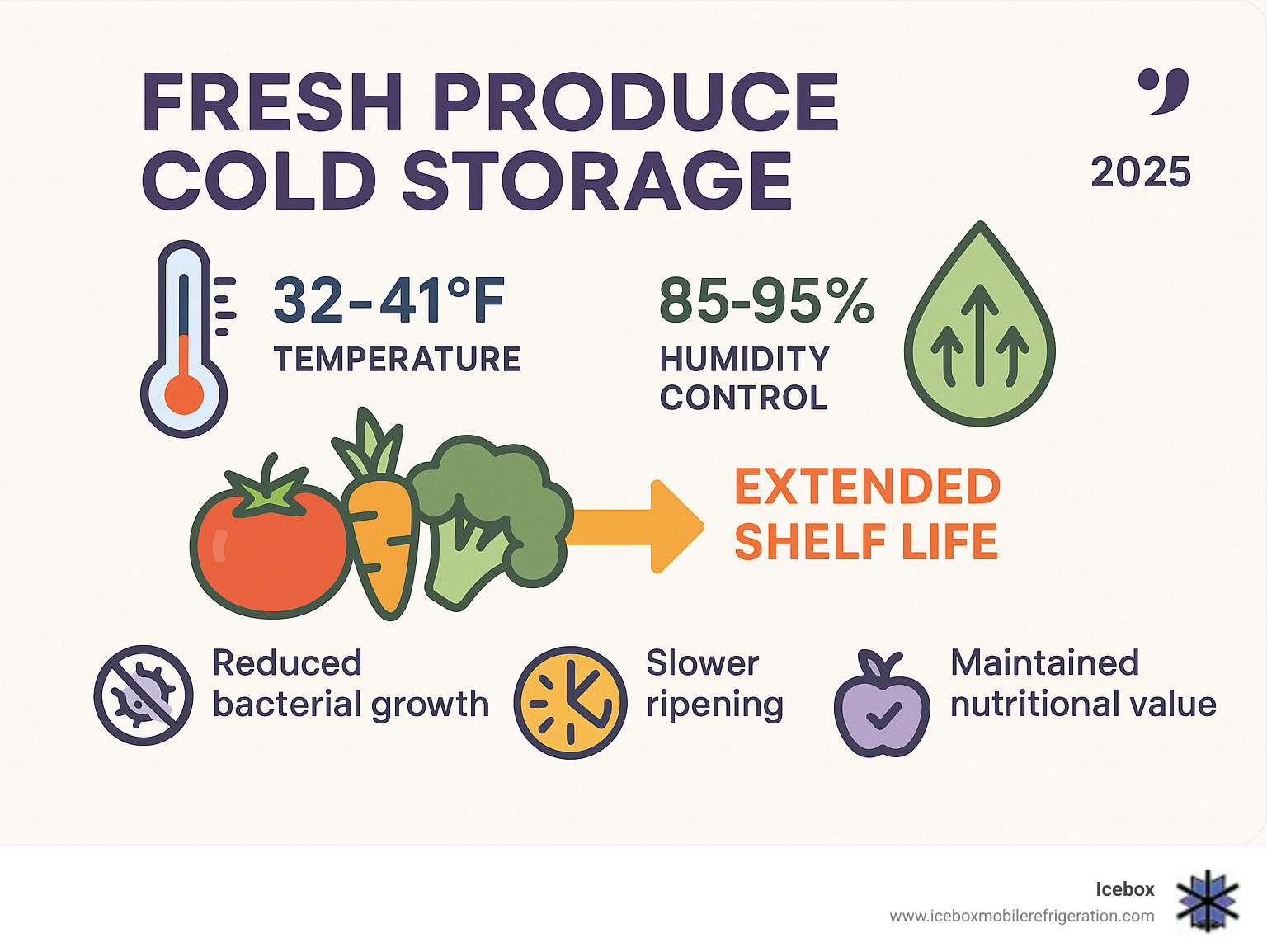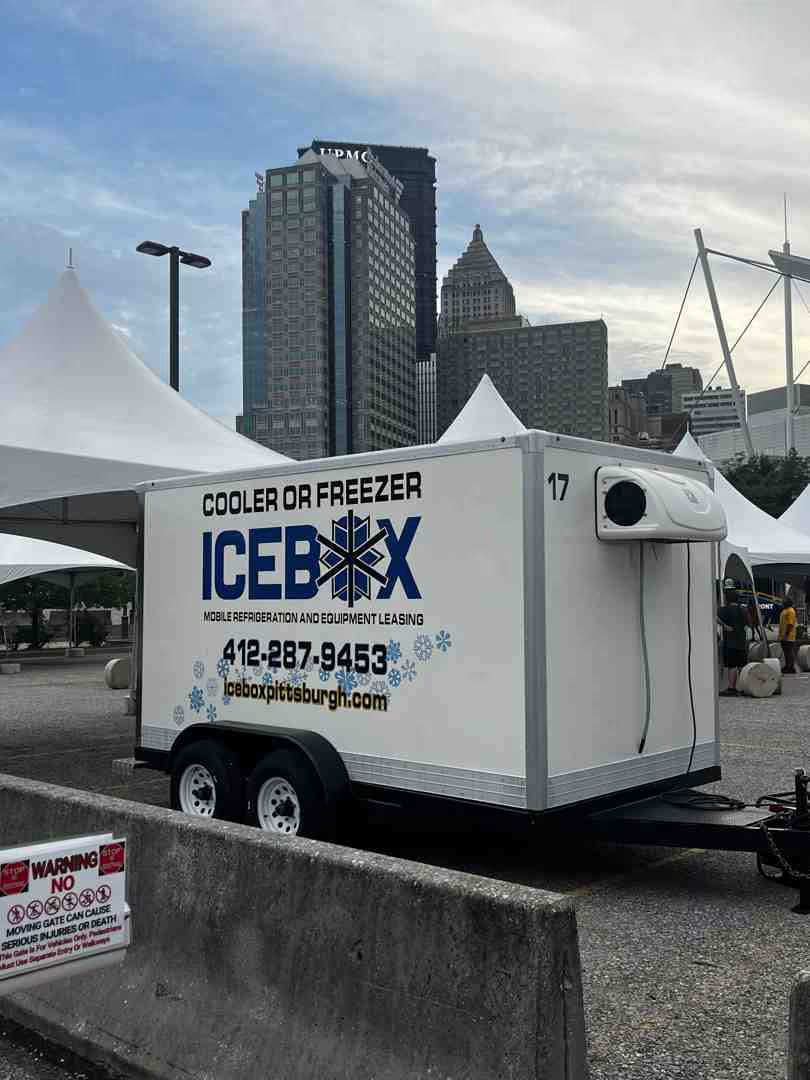Why Fresh Produce Cold Storage Is Critical for Your Business
Fresh produce cold storage is the practice of refrigerating fruits and vegetables between 32°F and 41°F. This simple step slows decay, extending shelf life by 2-4 times compared to room temperature. By controlling the environment, you preserve the quality, texture, and nutritional value of your produce from the moment it arrives.
The key benefits are clear:
- Extended Shelf Life: Keep produce fresh for weeks, not days.
- Reduced Waste: Minimize spoilage and protect your inventory investment.
- Quality Preservation: Maintain the flavor, color, and crispness your customers expect.
- Improved Food Safety: Inhibit the growth of harmful bacteria.
- Cost Savings: Buy in bulk and reduce the frequency of deliveries.
When your permanent refrigeration isn't enough—whether due to seasonal demand, a large catering event, or an unexpected equipment failure—a mobile refrigerated trailer provides an immediate, on-site solution. These units offer the same precise temperature control as a walk-in cooler, delivered directly to your location.

The Science Behind Fresh Produce Cold Storage
Even after harvest, fruits and vegetables are still living and breathing, a process that causes them to age and decay. Fresh produce cold storage works by dramatically slowing these natural processes, like hitting a pause button on spoilage.
Three key factors are at play:
Temperature: This is the most critical element. Lowering the temperature to the optimal range of 32°F to 41°F significantly reduces the respiration rate of produce. This means it "breathes" slower, conserving its energy and slowing deterioration. For every 18°F increase in temperature, the spoilage rate can double or even triple. Cold also inhibits the growth of bacteria and mold that cause foodborne illness and decay.
Humidity: Fresh produce is mostly water, and it loses moisture to the air, causing it to wilt and shrivel. The ideal humidity level for most produce is 85-95%. This high humidity prevents dehydration, keeping leafy greens crisp and fruits firm. However, too much moisture can lead to condensation and mold, which is why it must be carefully balanced.
Airflow & Ethylene Control: Proper air circulation is essential for maintaining a consistent temperature and humidity throughout the storage unit. It also serves another vital purpose: removing ethylene gas. Many fruits, like apples and avocados, naturally release this ripening hormone, which can cause nearby sensitive vegetables (like lettuce and carrots) to spoil quickly. Good airflow whisks this gas away, protecting all your inventory.
Our mobile refrigerated trailers are engineered to manage these three factors automatically, creating the perfect environment to keep your produce fresh for weeks instead of days.
Essential Fresh Produce Cold Storage Requirements
Effective fresh produce cold storage goes beyond just a cold space. Whether using a permanent walk-in or a mobile refrigerated trailer, focusing on these key requirements will maximize freshness and minimize waste.
- Consistent Temperature: The unit must reliably hold temperatures between 32 F and 41 F. Use digital thermometers to monitor conditions and ensure the system is working correctly.
- Proper Loading: Avoid overpacking. Leave space between crates and walls to allow for proper air circulation. Blocked airflow leads to warm spots and spoilage.
- Smart Packaging: Use vented crates or perforated bags that protect produce while allowing it to breathe. Airtight containers can trap moisture and ethylene gas, accelerating decay.
- Strategic Organization: Not all produce has the same needs. A simple organization strategy can make a huge difference. The most important rule is to separate produce that produces ethylene gas from produce that is sensitive to it.
- Ethylene Producers: Apples, avocados, peaches, pears, plums, and tomatoes.
- Ethylene-Sensitive: Leafy greens, carrots, broccoli, and cucumbers.
- Keep these two groups as far apart as possible. For detailed guidelines, university extension services offer comprehensive charts on produce storage needs, like this one from Michigan State University.
Standard vs. Controlled Atmosphere (CA) Storage
It's important to know the difference between the two main types of cold storage:
- Standard Cold Storage: This is what our mobile refrigerated trailers provide. It focuses on controlling temperature and humidity. It's the perfect, flexible solution for restaurants, caterers, and events needing to extend produce life for days or weeks.
- Controlled Atmosphere (CA) Storage: This is a highly specialized, long-term method used in large-scale facilities, primarily for storing items like apples for many months. It involves altering the oxygen and carbon dioxide levels in the air. Learn more about the science behind controlled-atmosphere storage. It is not practical or necessary for most on-site commercial or event needs.
For nearly all temporary or emergency storage situations, standard cold storage offers the ideal balance of effectiveness and accessibility.
On-Site Cold Storage for Food Service and Events
In the food service and event industries, you need flexibility. Mobile cold storage solutions, like the refrigerated trailers we offer, provide on-demand, precise temperature control right at your location, exactly when you need it.
Our mobile cooler and freezer trailers are perfect for:
- Emergency Backup: When your walk-in cooler fails, our 24-hour emergency service can deliver a trailer quickly, saving your inventory from spoilage and keeping your business running.
- Seasonal Demands: Handle holiday rushes, festivals, or peak summer inventory with ease. Rent a trailer to store bulk produce purchases without overcrowding your permanent storage.
- Event Catering: Cater any event, from outdoor weddings to large festivals, with confidence. We deliver walk-in trailers directly to your venue, ensuring your ingredients stay perfectly fresh.
- Kitchen Renovations or Relocations: Keep your operations going during a remodel with a temporary, on-site cold storage unit.
Our trailers are designed for convenience. They are delivered to your site and plug into a standard 110-volt outlet, making setup simple. We offer a range of sizes and temperature capabilities to meet your specific fresh produce cold storage needs, with service across the East Coast, including Ohio, Georgia, the Carolinas, Tennessee, Florida, West Virginia, and Pennsylvania.
Common Cold Storage Challenges and Solutions
Even with the best intentions, challenges can arise in fresh produce cold storage. Here are common issues and how to prevent them.
- Temperature Fluctuations: Inconsistent temperatures stress produce and accelerate spoilage. This is often caused by frequent door openings or a faulty unit.
- Solution: Minimize the time the door is open. Our mobile trailers are built with robust insulation and reliable refrigeration systems to maintain a stable temperature.
- Freezer Burn & Dehydration: This occurs when produce loses moisture, resulting in a shriveled, unappealing texture. It's caused by dry air or improper packaging.
- Solution: Use vented packaging and ensure the unit maintains proper humidity. Avoid blocking airflow by over-stuffing the trailer.
- Condensation and Mold: Water droplets on produce or walls indicate humidity is too high or air circulation is poor. This creates a breeding ground for mold.
- Solution: Ensure proper loading to allow for good airflow. A well-maintained unit with tight door seals will prevent warm, moist air from entering.
- Equipment Failure: A breakdown can be catastrophic for your inventory.
- Solution: Prevention is key. At Icebox, we carefully maintain our fleet of refrigerated trailers. And if an issue does arise, our 24-hour emergency service is there to provide a swift solution.
Frequently Asked Questions about Fresh Produce Cold Storage
Here are answers to the most common questions we hear about fresh produce cold storage.
What temperature should fresh produce be stored at?
The ideal range for most fruits and vegetables is 32°F to 41°F. This "Goldilocks zone" is cold enough to dramatically slow spoilage but warm enough to prevent freezing and texture damage. However, some items like bananas, potatoes, and onions should not be refrigerated and prefer a cool, dry place (around 60°F). Our mobile refrigerated trailers are designed to maintain the perfect temperature for the vast majority of produce.
How long can different types of produce stay fresh in cold storage?
Proper cold storage can extend the life of produce by 2 to 4 times. The exact duration depends on the item:
- Delicate Items (leafy greens, berries): 1-2 weeks.
- Hardier Produce (carrots, apples, peppers): 2-4 weeks.
- Storage Champions (cabbage, root vegetables): 1-3 months.
These timeframes rely on maintaining proper temperature, humidity, and airflow—all features of our mobile cooler trailers.
What's the difference between cold storage and freezer storage for produce?
It's all about the state of the product. Cold storage (32°F to 41°F) keeps produce fresh, crisp, and ready to use in salads or as-is. Freezer storage (0°F or below) preserves produce for much longer but changes its texture by freezing the water inside. Freezing is great for items you plan to cook or blend, but not for fresh applications.
Many of our mobile trailers can operate as either a cooler or a freezer (down to -20°F), giving you the flexibility to choose the right storage for your needs.
Conclusion
Mastering fresh produce cold storage is about protecting your investment, reducing waste, and delivering the quality your customers expect. The right temperature, humidity, and airflow lead directly to cost savings and greater consumer satisfaction.
But you don't need a permanent solution for a temporary problem. Whether you're facing a seasonal rush, an equipment emergency, or catering a large event, a flexible solution is essential.
That's where our mobile refrigerated trailers shine. We deliver reliable cold storage directly to you. Our 110-volt units are easy to set up, and our 24-hour emergency service means we're always ready to help. With delivery across the East Coast from Ohio to Florida, we provide the on-demand cold storage you need to keep your business running smoothly.
Your produce deserves the best, and your business deserves a reliable partner. When you need cold storage, we bring it to you.
Choose the perfect rental option
Explore our wide range of trailer rentals and find the one that suits your needs
%20(2)-min.webp)
Discover New Blog Posts
Stay updated with our latest blog content.





_compressed.webp)
